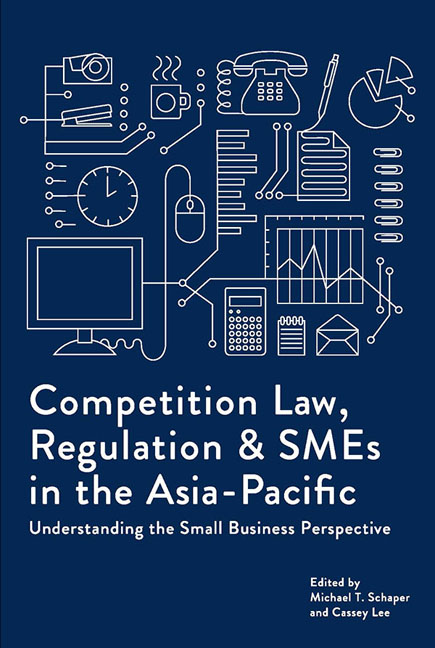 Competition Law, Regulation and SMEs in the Asia-Pacific
Competition Law, Regulation and SMEs in the Asia-Pacific Book contents
- Frontmatter
- Contents
- Foreword
- About the Contributors
- 1 Introduction: Making the Invisible SME More Visible in Competition Policy and Law
- Section 1 Theories And Basic Concepts
- Section 2 Smes And Competition Law
- Section 3 Country Studies
- 12 Competition Law, Regulation, and Trade: Implications for Productivity and Innovation in Singaporean Manufacturing SMEs
- 13 SME Law and Abuse of a Superior Bargaining Position in Japan
- 14 Competition Law, Policy, and Smes in South Korea
- 15 Competition Law Implementation and Smes: Singapore's Experience
- 16 Competition Law and SMEs in Indonesia
- 17 Smes and Malaysia's New Competition Law: Experiences to Date
- 18 Competition Policy and Sme Development in Vietnam
- 19 China's Anti-Monopoly Law and the Sme Sector
- 20 A New Competition Agency Learns to Deal with Smes: The Case of the Hong Kong Competition Commission
- 21 The Regulation of Television Programme Production Contracts under Japan's Subcontract Act
- 22 Small Enterprises and Competition Policy in Pacific Island Countries
- Index
18 - Competition Policy and Sme Development in Vietnam
from Section 3 - Country Studies
Published online by Cambridge University Press: 05 August 2017
- Frontmatter
- Contents
- Foreword
- About the Contributors
- 1 Introduction: Making the Invisible SME More Visible in Competition Policy and Law
- Section 1 Theories And Basic Concepts
- Section 2 Smes And Competition Law
- Section 3 Country Studies
- 12 Competition Law, Regulation, and Trade: Implications for Productivity and Innovation in Singaporean Manufacturing SMEs
- 13 SME Law and Abuse of a Superior Bargaining Position in Japan
- 14 Competition Law, Policy, and Smes in South Korea
- 15 Competition Law Implementation and Smes: Singapore's Experience
- 16 Competition Law and SMEs in Indonesia
- 17 Smes and Malaysia's New Competition Law: Experiences to Date
- 18 Competition Policy and Sme Development in Vietnam
- 19 China's Anti-Monopoly Law and the Sme Sector
- 20 A New Competition Agency Learns to Deal with Smes: The Case of the Hong Kong Competition Commission
- 21 The Regulation of Television Programme Production Contracts under Japan's Subcontract Act
- 22 Small Enterprises and Competition Policy in Pacific Island Countries
- Index
Summary
Vietnam embarked on an economic reform programme in 1986 aimed at transitioning from a centrally-planned to market-oriented economy. Since then, market competition has steadily increased with the participation of non-state owned enterprises, together with state-owned enterprises which dominated the economy during the period of central planning and, indeed, for much of the post-reform period. This has been the case particularly since the year 2000, when a breakthrough Enterprise Law was introduced resulting in strong growth of new business registrations. At the same time, the Vietnamese economy has taken significant steps towards closer economic integration with regional and international markets through its membership of ASEAN (Association of Southeast Asian Nations), APEC (Asia-Pacific Economic Cooperation), and the WTO (World Trade Organization).
The introduction of a Competition Law in 2005 further provided a legal framework with which to promote business development in Vietnam. This Law aimed to provide a fair competition environment for all businesses and types of ownership operating in Vietnam. This chapter discusses the basis, and the process, for the introduction of the Competition Law of Vietnam. It describes key features of the Law including specific provisions given to small and medium-sized enterprises (SMEs). It highlights the challenges in implementing the Law in general and to SMEs in particular. It also discusses the roles of key stakeholders in the implementation process, including the Vietnam Competition Authority. The chapter concludes with some suggestions as to how the Competition Law can be made more effective and relevant.
Introduction
Vietnam has attained significant achievements in economic performance since launching the package of economic reforms known as “Doi Moi” in 1986. The economic base has been greatly diversified with the participation of domestic state and private enterprises as well as foreign invested enterprises. The country has become economically integrated as a member of ASEAN (Association of Southeast Asian Nations), APEC (Asia-Pacific Economic Cooperation), and the WTO (World Trade Organization), having one of the highest trade-to- GDP (gross domestic product) ratios. It has also negotiated and concluded a number of bilateral free trade agreements as well as multilateral agreements. These economic reforms unleashed a burst of entrepreneurial energy that enabled Vietnam's economy to grow by 7–8 per cent annually for nearly two decades (Brown 2015).
- Type
- Chapter
- Information
- Competition Law, Regulation and SMEs in the Asia-PacificUnderstanding the Small Business Perspective, pp. 309 - 327Publisher: ISEAS–Yusof Ishak InstitutePrint publication year: 2016


